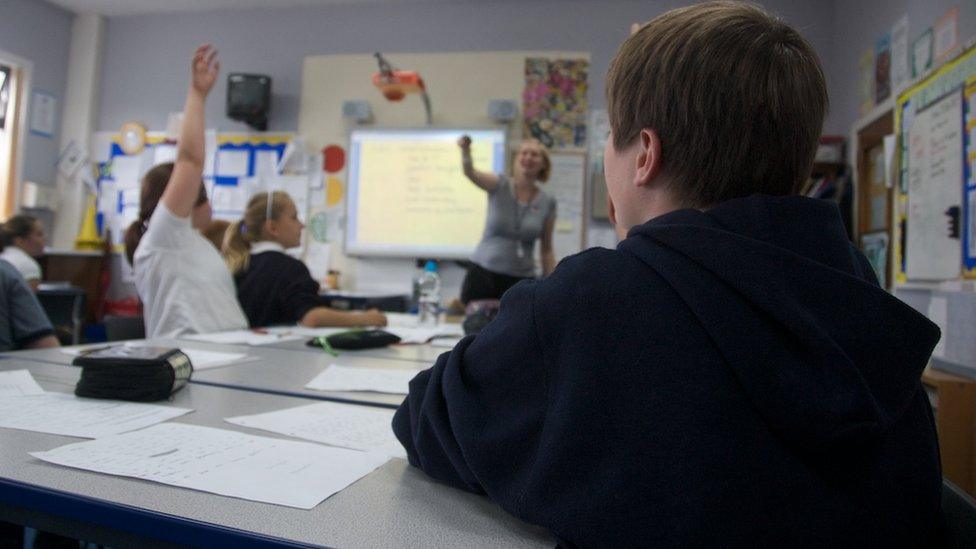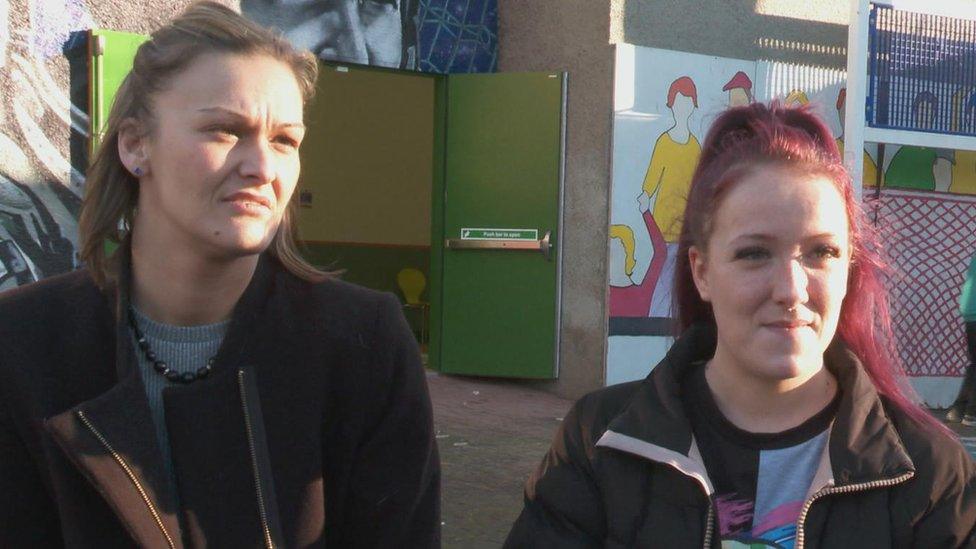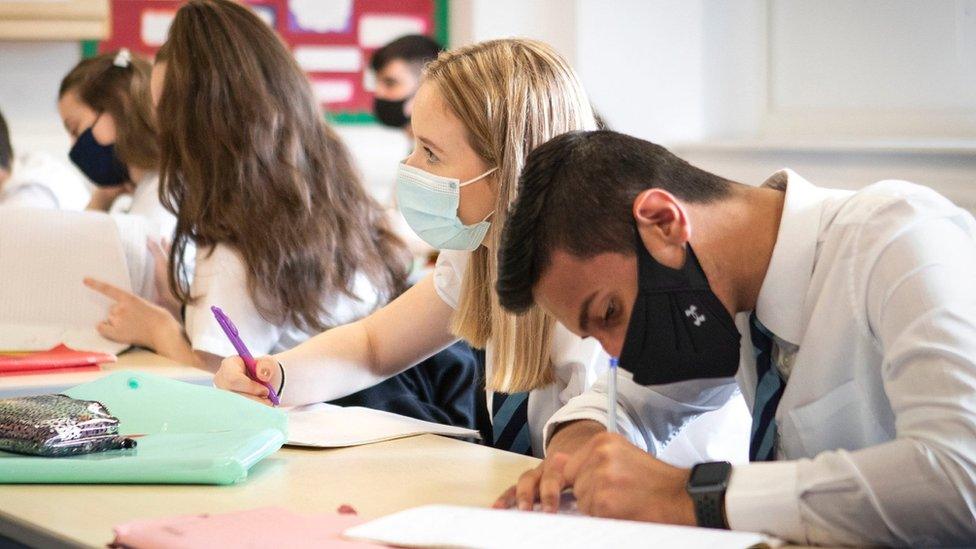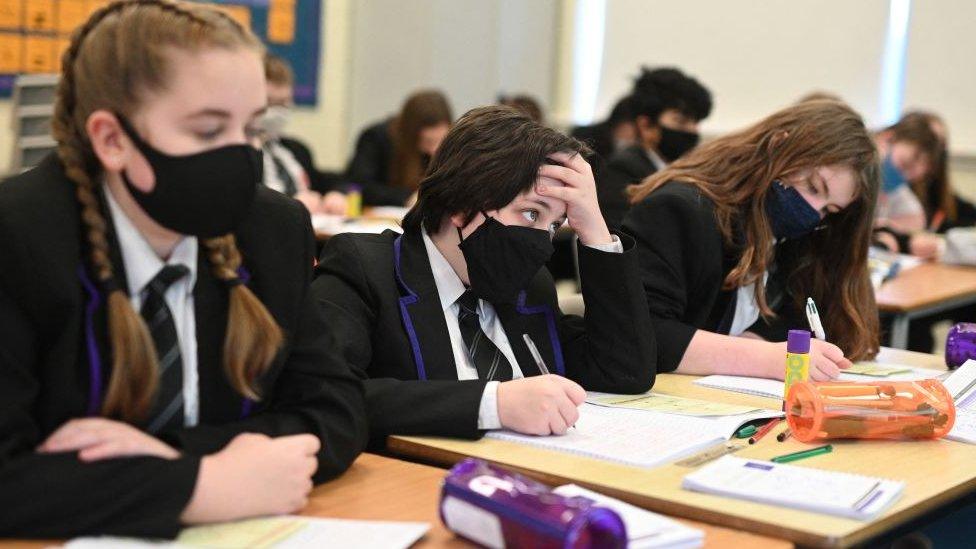Funding to close school attainment gap revamped
- Published

Most the funding for reducing the attainment gap goes directly to head teachers who decide on priorities
The funding system aimed at closing the attainment gap between poorer and richer pupils is to be changed so that money is distributed more widely.
Some of the budget was previously targeted at nine councils which have high levels of deprivation.
Education Secretary Shirley-Anne Somerville said the change reflected the impact of Covid across the country.
The Scottish Conservatives said little progress had been made on attainment despite years of investment.
Changes in the funding system were also criticised by Scottish Labour as a "betrayal of the most vulnerable children".
First Minister Nicola Sturgeon has described improving education and closing the attainment gap as her "defining mission".
Since 2015 almost £1bn has been spent, but a report from Audit Scotland earlier this year found inequalities remained "wide" and had worsened during the Covid pandemic.
Last year £215m was distributed with the biggest portion (£147m) allocated directly as "Pupil Equity Funding" to head teachers in every local authority.
Schools have spent the money on employing extra staff as well as purchasing equipment or supporting services like breakfast clubs.
But some of the money, totalling £43m, was targeted at nine "challenge authorities" with the highest concentrations of deprivation - Clackmannanshire, Dundee, East Ayrshire, Glasgow, Inverclyde, North Ayrshire, North Lanarkshire, Renfrewshire and West Dunbartonshire.
'Enhanced' role for councils
Ms Somerville told MSPs that this money would in future be shared by all 32 of the country's councils, with allocation depending on the number of low income families who lived there.
She said: "I fully recognise the impact of the pandemic and poverty on pupils in every local authority area in Scotland - reaching those impacted by poverty in urban and rural communities alike.
"Therefore, all local authority areas - not just the nine challenge authorities funded under the challenge to date - will have an enhanced leadership and support role to play."
Ms Somerville said a further £200m would be spent on closing the attainment gap next year, and the investment over the five year parliamentary term would be around £1bn, up from £750m in the previous parliament.


One of the criticisms from the Audit Scotland report was that some of these so-called "challenge councils" were in fact performing worse and not better when it came to closing the attainment gap, despite getting extra money for just that.
The government hasn't given it as the reason for its change of approach, but it does mean that particular problem goes away, in optics at least. It's decided instead to spread the money further, in the hope that it will reach more of those who need it.
What's staying from the previous system? A show of confidence in teachers. A special fund that's given directly to head teachers, based on the number of children who qualify for free school meals, is staying for another year.

The Scottish Conservatives accused the SNP of "rehashing the same failing initiatives".
Education spokesman Oliver Mundell said: "Nicola Sturgeon has broken her promise to close the attainment gap in the last parliament and nothing the SNP have set out show any real ambition to do so in this one."
He said "throwing money" at the system was bound to fail without a "credible plan to restore standards in our education system".
For Scottish Labour, Michael Marra said the changes to the funding system would inflict "callous cuts" in the poorest communities.
"This policy decimates education funding for the poorest children in the nine poorest local authorities in Scotland," he said.
"These children have suffered most in the pandemic, they have seen their life chances weakened."

'It's alright to ask for help'

Beckie Cunningham and Michaela Simpson know too well the constant financial demands of educating their children - but are determined it will not stand in the way of their success.
"When it comes to trips, books, fundraisers - sometimes you do really want to help but sometimes you feel well I can't really help that much but you do as much as you can, says Beckie, 25, from Edinburgh. "Even if it's not moneywise, even if it's just input or helping"
Michaela, 32, also from Edinburgh, says she wants her children to know "it's alright to ask for help" to achieve their ambitions.
"I want them to have that mental ability to say to themselves 'I want to better my life.' I would love them to go to university, college and have a career," she said.

John Dickie, from the Child Poverty Action Group said support work in schools should be coupled with action to tackle poverty at home.
"That's why we need to see investment in the Scottish child payment, for example, immediately doubling that payment as a matter of real urgency," he said.
"But we also need to see investment and action to support schools to work with children, young people and parents to identify all the barriers that they face at school."
Related topics
- Published23 March 2021

- Published22 October 2021
